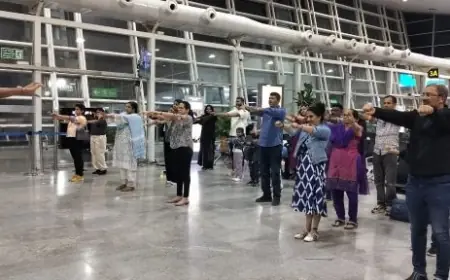
Hubballi: ‘Math and Mandir Are Living Institutions of Social Change,’ VP Highlights at Sumeru Parvata Inauguration
Daily Mail 24 Jan 16, 2025

Hubballi Senior Citizen Scammed Through Malicious APK File, Loses Over Rs 9 Lakh
Daily Mail 24 Jan 21, 2025

Hubballi: Citizens Can Now Directly Share Grievances Through Phone-In Program "Interaction with the Mayor"
Daily Mail 24 Jan 21, 2025

Hubballi-Based Porwal Enterprises: A One-Stop Solution for Furniture Needs
Daily Mail 24 Jan 21, 2025

Offenders’ Parade Held in Hubballi Following Bank Robbery and ATM Heist Incidents
Daily Mail 24 Jan 21, 2025

Post-Test Series Loss, BCCI Sends Indian Stars to Domestic Cricket Arena, Here is the List of Star Players
Daily Mail 24 Jan 21, 2025

Hubballi: Police Commissioner Emphasizes Vigilance in Cash Movement Operations
Daily Mail 24 Jan 20, 2025

Hubballi: Miscreants Target Nationalized Bank, Fail to Gain Entry
Daily Mail 24 Jan 20, 2025

Lakshmi Hebbalkar Responding Well to Treatment, Discharge Expected Soon: D.K. Shivakumar
Daily Mail 24 Jan 18, 2025

‘Vijayendra You Are Just a Kid’: Jarkiholi's Scathing Remarks Spark Row
Daily Mail 24 Jan 18, 2025

Dharwad: Town Police Solve House Burglary Case, Recover Valuables Worth ₹6.45 Lakh
Daily Mail 24 Jan 18, 2025

India Unveils 15-Member Squad for Champions Trophy 2025; Rohit to Lead, Jaiswal Makes ODI Debut
Daily Mail 24 Jan 18, 2025

Old Hubballi Man Arrested for Sexually Assualting Minor; Investigation Points to Serial Offences
Daily Mail 24 Jan 18, 2025

13 km in 13 Minutes: Hyderabad Metro Creates Green Corridor for Emergency Heart Transfer
Daily Mail 24 Jan 18, 2025

8th Pay Commission Approved: Highlights and Impact on Central Government Employees
Daily Mail 24 Jan 16, 2025

Hubballi: ‘Math and Mandir Are Living Institutions of Social Change,’ VP Highlights at Sumeru Parvata Inauguration
Daily Mail 24 Jan 16, 2025

Hubballi Senior Citizen Scammed Through Malicious APK File, Loses Over Rs 9 Lakh
Daily Mail 24 Jan 21, 2025

Hubballi: Citizens Can Now Directly Share Grievances Through Phone-In Program "Interaction with the Mayor"
Daily Mail 24 Jan 21, 2025

Hubballi-Based Porwal Enterprises: A One-Stop Solution for Furniture Needs
Daily Mail 24 Jan 21, 2025

Offenders’ Parade Held in Hubballi Following Bank Robbery and ATM Heist Incidents
Daily Mail 24 Jan 21, 2025

Post-Test Series Loss, BCCI Sends Indian Stars to Domestic Cricket Arena, Here is the List of Star Players
Daily Mail 24 Jan 21, 2025

Hubballi: Police Commissioner Emphasizes Vigilance in Cash Movement Operations
Daily Mail 24 Jan 20, 2025

Hubballi: Miscreants Target Nationalized Bank, Fail to Gain Entry
Daily Mail 24 Jan 20, 2025

Lakshmi Hebbalkar Responding Well to Treatment, Discharge Expected Soon: D.K. Shivakumar
Daily Mail 24 Jan 18, 2025

‘Vijayendra You Are Just a Kid’: Jarkiholi's Scathing Remarks Spark Row
Daily Mail 24 Jan 18, 2025

Dharwad: Town Police Solve House Burglary Case, Recover Valuables Worth ₹6.45 Lakh
Daily Mail 24 Jan 18, 2025

India Unveils 15-Member Squad for Champions Trophy 2025; Rohit to Lead, Jaiswal Makes ODI Debut
Daily Mail 24 Jan 18, 2025

Old Hubballi Man Arrested for Sexually Assualting Minor; Investigation Points to Serial Offences
Daily Mail 24 Jan 18, 2025

13 km in 13 Minutes: Hyderabad Metro Creates Green Corridor for Emergency Heart Transfer
Daily Mail 24 Jan 18, 2025

8th Pay Commission Approved: Highlights and Impact on Central Government Employees
Daily Mail 24 Jan 16, 2025

Hubballi: ‘Math and Mandir Are Living Institutions of Social Change,’ VP Highlights at Sumeru Parvata Inauguration
Daily Mail 24 Jan 16, 2025

























































